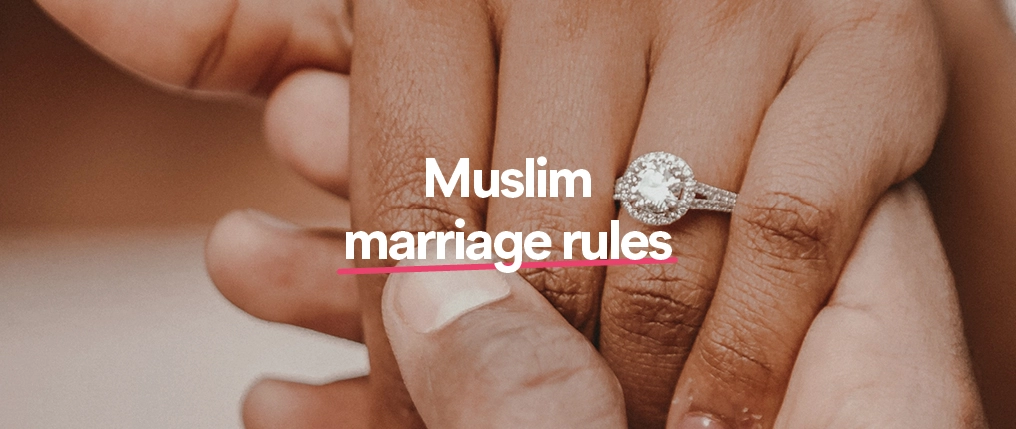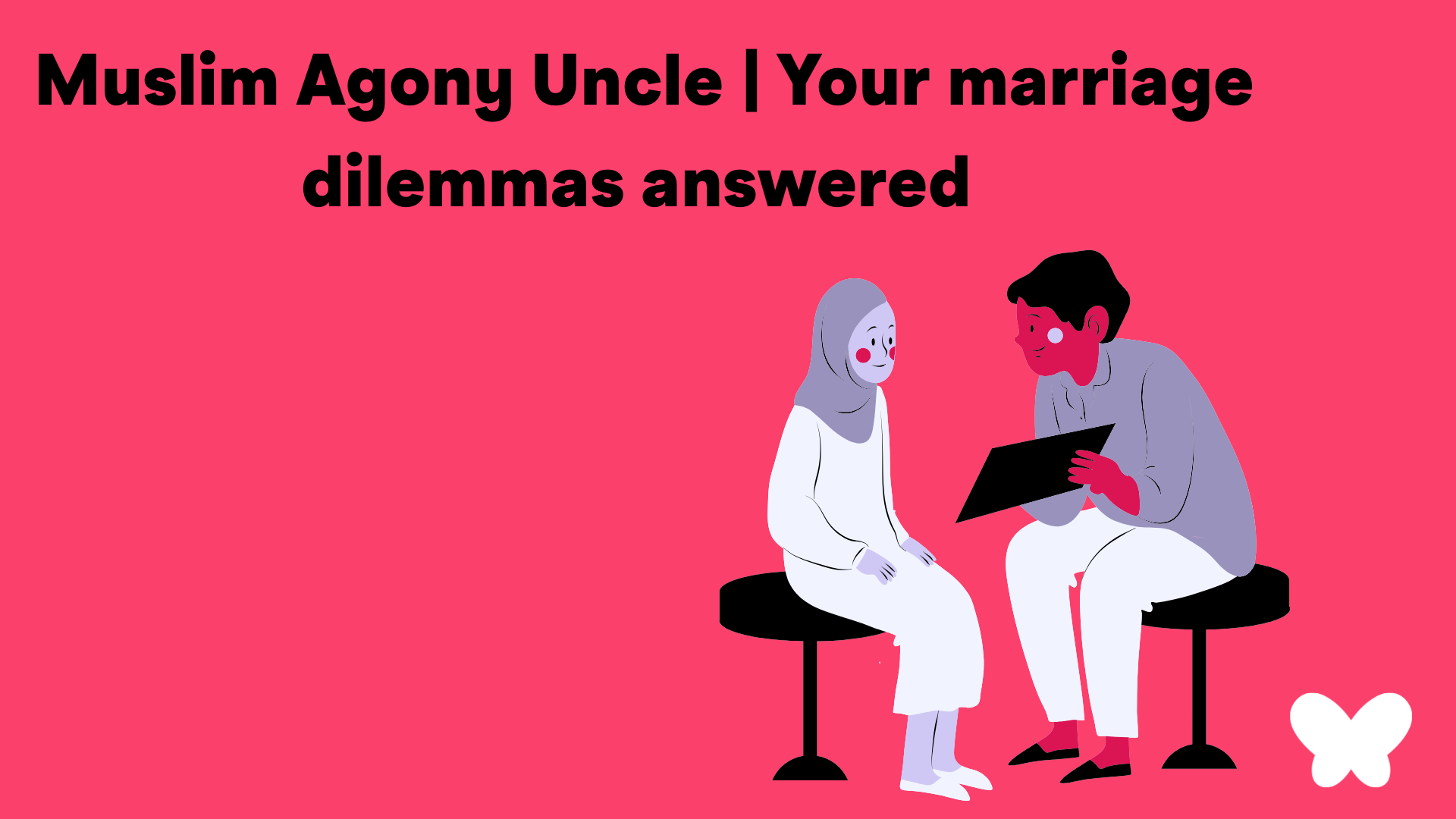
What are the Muslim marriage rules?
June 29, 2023

Muslim marriage rules are like the compass that guides Muslims in their quest for a lifelong partner. They’re designed to ensure that marriage is built on a solid foundation of mutual respect, shared values, and divine blessings.
These rules may vary across different cultures and communities, but the essence remains the same: to uphold the sanctity of marriage and foster an environment of love, understanding, and spiritual growth.


Looking for your soulmate?
You won’t find your soulmate on this blog post but you might find them on Muzz - the world’s biggest Muslim dating and marriage app.
So, whether you’re curious about the concept of a marriage contract, the role of a wali (guardian), or the significance of the mahr (dowry), we’ll be exploring it all in this post. Let’s get started.
Table of contents
Mutual consent
In Muslim marriages, it’s all about love and choice. You see, Muslim marriages are built on the foundation of two individuals coming together willingly, without any force or coercion.
That’s right, no one should ever be pressured into a marriage they don’t genuinely want. It’s all about that beautiful concept of consent!
When it comes to Muslim marriage rules, mutual consent is non-negotiable. Both the bride and groom must agree to enter into the sacred bond of matrimony. It’s about that magical moment when they look into each other’s eyes and say, “Yes, I want to spend my life with you.”
Related content: Things I wish someone told me before my Muslim marriage
It’s a decision made freely, without any external influences. This emphasis on consent ensures that love blossoms in an atmosphere of trust, respect, and genuine affection.

Mahr (Dowry)
The mahr is a special gift that the groom gives to the bride as a symbol of his commitment and financial responsibility. It’s a way for the groom to show his love and dedication to his future spouse. But that’s not all!
Here’s another thing: the mahr is not just any random gift. It’s actually agreed upon and specified in the marriage contract. The amount or nature of the mahr is determined by the couple themselves, based on what they mutually agree upon.

Long story short, it’s a way for the bride to be financially supported and protected in case of any unforeseen circumstances. Truth is, the mahr is a beautiful tradition that shows the importance of care and provision in Muslim marriages.
Guess what? The best part is that the mahr is solely the bride’s right, and she has full control over how she wants to use it. Whether she decides to save it, invest it, or spend it as she pleases, it’s entirely up to her.
Marriage contract
A formal marriage contract, which is also called Nikah Nama, is a written agreement between the bride and groom that outlines their rights, responsibilities, and expectations in the marriage. It’s a way to establish clarity and ensure a solid foundation for the journey ahead.
But the marriage contract is not just a piece of paper. It holds a lot of weight and importance in Muslim marriages. It’s a way for the couple to openly communicate their desires and set the terms of their union. It covers aspects like financial matters, division of household responsibilities, and even provisions for divorce, if necessary.
The marriage contract is like a roadmap that guides the couple in their marital journey, ensuring that they’re on the same page and have a shared understanding of their roles and obligations.

Truth is, it’s a practical and transparent way to establish a strong and healthy partnership. The best part is that the marriage contract can be customized to fit the couple’s unique needs and preferences. It’s not a one-size-fits-all approach. Whether they want to include specific clauses or make adjustments based on their circumstances, it’s all up to them.
Related content: Everything you need to know about Nikkah
What does that mean for you? Well, it means that in Muslim marriages, there’s room for open dialogue, negotiation, and setting the stage for a harmonious and fulfilling partnership.
Witnesses
Witnesses play a crucial role in validating the marriage contract and making sure everything is done properly. Sounds pretty important, right? So, let’s dive in and discover why witnesses are an essential part of the Muslim marriage process.
Here’s the deal: witnesses are there to witness the marriage contract being signed by the bride, groom, and their respective representatives. They act as neutral observers, making sure that everything is done in accordance with Islamic traditions.
It’s like having cheerleaders on the sidelines, rooting for the couple and ensuring that all the legal formalities are met. Well, think of witnesses as the guardians of authenticity and legality. Their presence adds an extra layer of assurance and validity to the marriage, giving it a stamp of approval from the community.
They ensure that the marriage is properly documented and recognized by both religious and legal authorities. Having witnesses is a way to uphold the integrity of the marriage process and ensure that everything is done in the right way.

Now you’re probably wondering, “Who can be a witness?” Witnesses can be family members or close friends. Generally, the marriage takes place in the presence of two male witnesses or one male and two female witnesses.
So, whether it’s your best friend or a sibling, their presence as witnesses adds a sense of community and support to the marriage ceremony.
Wali
A wali is like a guardian or a protector who plays a significant role in the marriage process. Sounds intriguing, right? So, let’s uncover the importance of the wali in Muslim marriages.
The wali is usually a male figure, often a father, brother, or another close male relative of the bride. Their role is to support and guide the bride throughout the marriage journey. Think of them as the superheroes who ensure that everything is done in the best interest of the bride, protecting her rights and well-being.
Now you’re probably wondering, “What does the wali actually do?” Well, the wali’s responsibilities include giving consent for the marriage, representing the bride’s interests during the marriage negotiations, and being a source of wisdom and support throughout the process.
The wali is like the bride’s trusted advisor and advocate, ensuring that her voice is heard and her rights are protected. Having a wali adds a layer of support and reassurance, creating a sense of family involvement and care in the marriage journey.
As we mentioned above, the consent and happiness of the bride are paramount. The wali’s role is to facilitate and ensure that the bride’s wishes and preferences are respected.
Their involvement is not about control or dominance, but rather about upholding the principles of mutual consent and respect. The wali acts as a guide and protector, but ultimately, the decision to marry rests with the bride herself.
So, having a wali is like having a trusted ally by your side, ensuring that your journey towards marital bliss is filled with love, support, and empowerment.

Marriage ceremony
Now let’s talk about one of the most exciting and joyous moments in Muslim marriage rules: the marriage ceremony also called the Nikah ceremony.
Picture this: a beautiful gathering of loved ones, vibrant decorations, and an atmosphere filled with love and celebration. Sounds amazing, right? So, let’s see what makes the Muslim marriage ceremony so special.
Related content: What is a Nikkah?
The marriage ceremony is like the grand finale, the pinnacle of the entire journey. It’s the moment when the bride and groom officially come together as husband and wife.
Now, you’re probably wondering, “What happens during the marriage ceremony?” Well, the ceremony typically begins with a recitation from the Quran, followed by the solemnization of the marriage contract. This is when the bride, groom, and their witnesses come together, and the marriage contract is signed. It’s a symbolic act, a beautiful expression of commitment and love.
Related content: The ultimate guide to preparing for a Nikah ceremony
And the best part? After the contract is signed, it’s time for celebration! The marriage ceremony is usually followed by joyful festivities, where family and friends come together to feast, dance, and rejoice in the union of two souls. It’s a time for laughter, good wishes, and creating memories that will be cherished for a lifetime.
The marriage ceremony varies across different cultures and communities, adding their own unique flavours and traditions. From vibrant wedding attire to traditional rituals, each ceremony is a reflection of the couple’s heritage and the richness of their cultural backgrounds.
Whether it’s the exchange of rings, the sharing of sweets, or the throwing of colourful confetti, the marriage ceremony is a joyous celebration of love and unity.
So, if you will attend a Muslim wedding get ready to dance, sing, and embrace the magic of it. It’s a moment that marks the beginning of a beautiful chapter in the lives of the bride and groom.

Prohibited Marriages
Prohibited marriages are a no-go according to our faith. You might be curious about the types of marriages that are prohibited.
In Islam, we cannot marry certain close relatives, like our parents, siblings, or children. It’s a way to maintain the integrity of family relationships and avoid complications.
It’s not just limited to blood relations. We are also prohibited from marrying those who are already in a valid and existing marriage. This is to protect the sanctity of marriage and ensure fairness for all parties involved.
Understanding these prohibited marriages is crucial to ensure we navigate the world of relationships within the boundaries set by our faith.

Divorce
We know it’s not the most pleasant topic, but it’s important to understand how divorce fits into our Muslim marriage rules. Let me ask you this: have you ever wondered what happens if things don’t work out in a marriage?
Well, the truth is, divorce is a part of life, and Islam recognizes that. But divorce is not something we take lightly. We gotta go through a process, a journey of healing and reflection. It’s about making sure we’ve tried our best to salvage the relationship before making that final decision.
So, divorce is a difficult path, but sometimes it’s necessary for our well-being and the well-being of those involved. We need to approach it with empathy and compassion, keeping our faith and values in mind.
Divorce doesn’t mean it’s the end of the world though. It’s just a new chapter in our lives. It’s like hitting the reset button and starting fresh.

But what does divorce mean for Muslims? Well, it means finding strength within oneself and seeking support from their loved ones and the community. It’s about healing and taking care of oneself, both emotionally and spiritually.
And guess what? Islam encourages us to treat each other with kindness and fairness, even in the midst of divorce. It’s about honouring the rights of both parties involved and finding a resolution that respects our Muslim marriage rules.
If you ever find yourself facing the possibility of divorce, know that you’re not alone. Lean on your faith, your loved ones, and the guidance of Allah to navigate this challenging journey. You got this!
Conclusion
We’ve reached the end of this blog post on Muslim marriage rules, and we hope you’ve found it helpful.
To summarize, when it comes to Muslim marriage rules, it’s not just about following a set of guidelines, but rather embracing a way of life that brings us closer to Allah and strengthens our relationships.
As you embark on your own path of love and marriage, remember the importance of mutual consent, respect, and communication. Ask yourself, are you approaching relationships with love and compassion? Are you honouring the rights and boundaries set by Islam?
Let’s keep in mind that these rules are here to protect us, and to help us build strong and healthy foundations for our marriages. They’re a reminder that love and commitment are not just about the here and now, but about the lifelong journey we’re embarking on.

